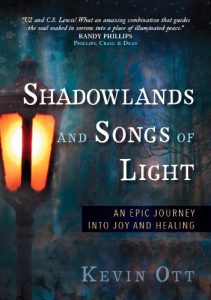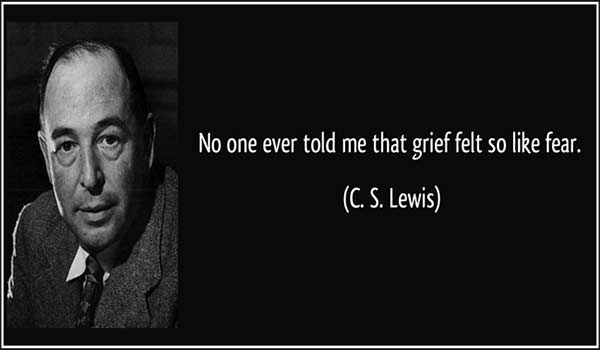 Quick note for fans of C. S. Lewis and/or U2 before the article begins:
Quick note for fans of C. S. Lewis and/or U2 before the article begins:
When life’s sorrows bring us into shadowlands, we need the joy of Christ to restore our strength. We tap into this joy by nurturing a deeper longing for God. Shadowlands and Songs of Light: An Epic Journey into Joy and Healing takes you on a quest for joy and a life-changing longing for God.
Written by a C. S. Lewis expert and a skilled composer, the book explores 18 beloved C. S. Lewis classics, from Narnia to Mere Christianity, and 13 spiritual principles behind the art of songwriting, as seen in 13 studio albums by U2–all to answer one question: how do we experience deeper joy in our relationship with Christ during times of sorrow and trial?
Shadowlands is available to pre-order at Amazon or ChristianBooks.com. If you pre-order a copy, the author will personally email you with a thank-you note and a copy of his upcoming e-book devotional “Devotions with Tolkien,” which uses J. R. R. Tolkien’s epic “The Lord of the Rings” and Scripture. (This is all on the honor system: simply pre-order Shadowlands, and then send an email to shadowlands2016 (at) gmail (dot) com letting the author (Kevin Ott) know you’ve ordered it, and he will contact you.)
Text LIGHT to 54900 to get a preview of Shadowlands and Songs of Light.
***
The late Lauren Bacall — Hollywood silver screen legend and wife of Humphrey Bogart — once said, “Your whole life shows in your face, and you should be proud of that.”
Anybody paying attention to the world right now will have added a few more lines of sorrow to their face. These are times that try our souls.
This week, besides losing one of the most beloved personalities in American culture (Robin Williams), we lost one of the last icons from the Golden Age of Hollywood (Bacall). As an ardent fan of movies and of these actors in particular, this was a painful week for me. And, if these losses weren’t sad enough, journalists are reporting new horrors and tragedies on a daily basis — both near and abroad.
It’s times like these when we need to keep an eternal perspective. The Christian believes that his or her true home is not this earth but Heaven. When we remember our true citizenship, it helps us push through times of great sorrow in this world, which C.S. Lewis called “the valley of tears.” Speaking of Lewis, here are a few moments from Lewis’s writings that help us see our true Home with vibrant colors and greater clarity:
1. The magnificent “solidness” of Heaven in The Great Divorce.
In the short fiction work of The Great Divorce, when a group of lost souls in “grey town” (Hell, perhaps, or a sort of transitory “holding tank” until Judgment Day), are given leave to visit the foothills of Heaven, they find that Heaven is so solid compared to their ghostly forms that not even the blades of grass will bend under their weight; and, in fact, the grass pierces their feet like swords. They’re also unable to lift the leaves, as if the smallest leaf weighs two tons.
Encouragement: Although the book is a work of theological fantasy fiction, Lewis makes a profound observation: Heaven’s substance is the true reality, and all other places below it, whether this temporary universe or Hell, are flimsy in comparison — so much so that a soul cannot even bend a blade of grass in Heaven unless they are one of its citizens. It’s a powerful reminder that this world is not our true home, and that we “seek a better country,” as Hebrews 11 puts it.
2. The tears of Aslan in The Magician’s Nephew.
In this book, which is the first in The Chronicles of Narnia series, the boy Digory asks Aslan the lion to heal his dying mother. He pleads with Aslan in fear, as if he were petitioning a frightening, distant monarch. But when Digory looks up from his tears and sees Aslan’s face, he’s shocked to find Aslan crying bigger tears than Digory over his mother. Digory realizes that Aslan has a greater love for Digory’s mother than he does.
Encouragement: Although the Narnia books are not a strict allegory, Aslan is certainly a Christ figure. This scene with Digory reminds us of a powerful truth that Scripture supports: Christ loves our loved ones more than we do, and He feels our grief more keenly than we do. This realization strengthened my heart when I lost my mother.
3. The glimpse of unspoilt paradise in Perelandra.
In Book Two of Lewis’s Space Trilogy, the hero Ransom finds himself in a paradise world untouched by the Fall (the sin of humanity).
Encouragement: If a mortal writer can dream up a world like Perelandra that fills the heart with such awe, imagine what God can do with Heaven. In an indirect but powerful way, Perelandra reminds us that our true home — Heaven — will be more wonderful than anything we can imagine. Here’s a description from Perelandra when Ransom eats one of the fruits of paradise:
“Moved by a natural impulse he put out his hand to touch it. Immediately his head, face, and shoulders were drenched with what seemed (in that warm world) an ice-cold shower bath, and his nostrils filled with a sharp, shrill, exquisite scent that somehow brought to his mind the verse in Pope, ‘die of a rose in aromatic pain.’ Such was the refreshment that he seemed to himself to have been, till now, but half awake. When he opened his eyes— which had closed involuntarily at the shock of moisture— all the colors about him seemed richer and the dimness of that world seemed clarified.”
Lewis, C. S. (2012-04-03). Perelandra: (Space Trilogy, Book Two) (Kindle Locations 727-731). Harper Collins, Inc.. Kindle Edition.


